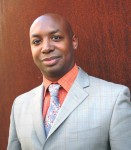Mark Sawyer spoke Spanish with a Cuban accent, despite growing up in the United States. While leading study abroad programs in San Juan, Puerto Rico, locals would call him “El Cubano.”
Sawyer, a political science and African American studies professor known for his work on race relations in Cuba, died March 26 in Los Angeles. He was 45.
He co-founded the Center for Race, Ethnicity and Politics and helped create the African American studies department at UCLA. Sawyer also mentored many graduate students and urged people to express their identities instead of conforming to the traditional image of how an academic presented themselves.
Jonathan Collins, a graduate student in political science, met Sawyer as an undergraduate student when the Ralph J. Bunche Center for African American Studies hosted students from historically black colleges for a program simulating graduate school. He was surprised by how personable and easygoing Sawyer was, he said.
“You’d see Mark walking around campus in tracksuits and Timberland boots,” he said. “He’s the guy you would never pick out of a crowd and say, ‘Oh yeah, he’s a full professor at the University of California, Los Angeles.'”
After being diagnosed with bipolar disorder, Sawyer had to take medical leave from the university. But despite not being able to act as Collins’ advisor, Sawyer continued to write letters of recommendation for Collins and communicated with him regularly about his ideas, Collins said.
“The best opportunities to learn from him came from going into his office and talking to him for half an hour,” he said.
Hector Cordero-Guzman, a public and international affairs professor at the Baruch College of the City University of New York, said he remembers spending time with Sawyer and their families while in Puerto Rico in the summer of 2012. He said they would go sightseeing together and once decided to go to a tropical rainforest.
“We spent our day trekking, watching our children enjoy nature and see things they hadn’t seen before, “ he said.
In the United States, Cordero-Guzman said Sawyer kept up a public presence through social media and television. He would often appear on news shows such as Fox News and discuss topics like immigration, even though the audience was sometimes hostile toward his ideas, Cordero-Guzman said.
“He saw it as a challenge to think about how he could communicate his message to people who weren’t predisposed to accept it,” Cordero-Guzman said. “He wanted to communicate, break stereotypes and build bridges across communities.”
Candice Benbow, a lecturer in women’s and gender studies at Rutgers University was one of many students that Sawyer mentored.
“He helped me to see that you can be in the academy and you can be young, you can be fresh and you can be yourself,” she said.
She said Sawyer was always transparent about the realities of academia, especially regarding the treatment of people of color.
“He made people aware that there’s going to be a constant critique of our scholarship and that because we are researching ourselves and issues that directly affect us, there will be questions of whether there’s bias,” she said. “He would just say, ‘We need to keep doing this.'”
One of the last times Collins saw Sawyer was about a month ago in his office, when the pair spoke about the show Black-ish and how it addressed many of the struggles they face as African American men, Collins said. As always, Sawyer put Collins at ease and he remembers laughing a lot, he added.
“There’s all these expectations about how you’re supposed to carry yourself as an academic,” Collins said. “You need to speak a certain way, dress a certain way and Mark really played back against that and let people know you can forge your own path.”
UCLA will host a public memorial service for Sawyer on campus in May.
